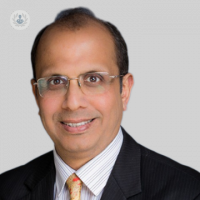Inguinal hernia repair surgery: what to expect
Autore:Inguinal hernia is the commonest type of hernia and can be felt like a pressure in the groin. Usually, it can be determined via a physical examination with a doctor, who asks the patient to cough to make the hernia more prominent. The patient might need an ultrasound if it is not as apparent.
Mr Sanjay Agrawal is a leading surgeon in London who specialises in inguinal hernia surgery. Here he explains everything you need to know about hernia surgery, including whether surgery is the only option, whether there is a risk of recurrence if you do have an operation and what to expect during recovery post-surgery.

What is inguinal hernia?
Inguinal hernia is a protrusion of the abdominal cavity content through the inguinal canal within the groin area. The symptoms for inguinal hernia may include pain or discomfort, or swelling, especially with coughing, exercise, or bowel movement. Often it gets worse throughout the day and improves when lying down.
Is it necessary to have surgery?
All cases of inguinal hernia need surgery because of a risk of obstruction or strangulation to the hernial contents within it (fat or bowel). Surgery needs to be done soon on an elective basis unless when strangulation happens and it needs to be done as an emergency.
What are the surgical options for inguinal hernia repair?
For an adult with inguinal hernia, a mesh has to be placed to repair it. This can be done either through open-techniques or using laparoscopic (keyhole) technique. Laparoscopy has an advantage because there are less pain and quicker recovery over open techniques. The laparoscopic (keyhole) technique is the most commonly performed approach for bilateral inguinal hernia repair.
Is there a risk of recurrence of hernia after surgery?
Yes, there is a small risk of recurrence of hernia after surgery, which is less than 1% although it does increase over a period of time, post-operation.
What are some ‘do’s and don’ts’ during recovery?
The patient is sent home with pain medication, which may or may not be necessary. If all goes well, the patient is usually discharged on the same or next day. They are up and about, though it may be advisable to take it easy for the first week or two. Patients are advised not to lift heavy weights, or run or exercise for up to six after hernia repair surgery.
Do not hesitate to book an appointment with Mr Agrawal via his Top Doctor’s profile here if you would like to discuss your inguinal hernia surgery options.


